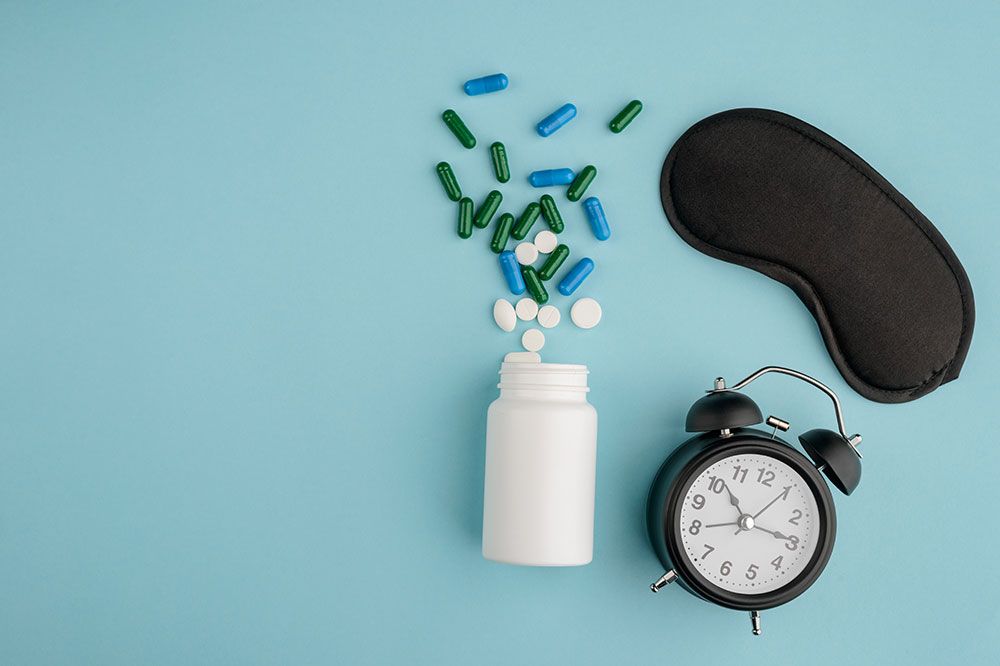By Rychel Johnson, M.S., LCPC, Licensed Clinical Professional Counselor
Updated on August 23, 2023
Published on March 6, 2023

Get latest news, updates, and trends on mental well-being

Our modern culture is laden with tired people. Wearing productivity and busyness like a badge of honor, you would think sleeping less is a contest.
Approximately 1 in 4 American adults report having significant sleep disturbance 15 of 30 days per month. Think of that—HALF of their days are spent with sleep deprivation (defined as getting less than 6 hours of sleep). Of these individuals, 1 in 12 adults reports utilizing a sleep aid most nights of the month.
Frankly, sleep deprivation is common but, indeed, not normal. People recognize this. Enter sleep aids to the rescue.
As a holistically-minded mental health provider, I gravitate toward more natural and safer sleep improvement methods. My go-to recommendations for therapy clients are melatonin and calming teas like chamomile, with the caveat that quality sleep is multi-faceted.
This naturally occurring hormone, released by the pineal gland, is considered a harmless supplement to address sleep issues. However, depending on who you ask, melatonin loses effectiveness the longer it’s used. While it’s a natural and seemingly harmless approach, the body may stop producing adequate melatonin naturally when administered as a daily sleep aid. As with any sleep aid, there’s a chance a slight placebo effect is occurring with melatonin.
Chamomile is a flowering plant known to induce sleep. It’s recommended that the tea be consumed about 45 minutes before bedtime for a calming effect. The effect is mild enough that chamomile can be consumed to soothe a frazzled mind during the day—without the tranquilizer impact of medications. There are no side effects, but, like melatonin, chamomile may not touch a severe sleep issue like insomnia. Studies are lacking on whether this tea aids individuals’ ability to stay asleep.
Lack of sleep has many potential consequences. Fatigue and reduced energy are apparent; add in decreased brain function, and you have a recipe for disaster. Mood, decision-making ability, and focus are primary casualties of sleep deprivation.
It’s a more pervasive issue than we think: it seems like many people write off sleep issues that aren’t overly impactful. I have therapy clients who report feeling that their sleep issues aren’t “that bad” because they know of people who struggle more. Sleep debt isn’t a competition.
Sleep and mental health:
“So, sleep benefits my mental health?” It’s a question I receive at least once a week in my therapy practice. While I’m surprised that it isn’t common knowledge, I realize I must check myself, as it isn’t as common knowledge as one may think. In my therapy caseload, approximately 25% of my clients experience some form of sleep disturbance – including insomnia at worst, sleep paralysis, frequent night wakings, and, most often, simply trouble relaxing their thoughts enough to fall asleep.
I’ve heard it all—therapy clients struggle with falling asleep, staying asleep, getting through the afternoon slump, and noticing their sleep deprivation makes them irritable at work and home. Some folks even report not wanting to socialize because low-quality sleep impacts their moods.
Sleep is foundational to our physical, emotional, and psychological health. Think of Maslow’s hierarchy of needs: the infamous pyramid visual, which many of us learned in Psych 101. At the base of Maslow’s pyramid are rest, food, warmth, or the bare minimum human requirements if we expect to flourish.
According to experts, sleeping pills are not designed to be a long-term solution but are undoubtedly habit-forming. We live in a fast-paced world, and shifting gears into relaxation is challenging for the average adult working full-time jobs or managing a busy household (and often both!). Mental health rates have increased exponentially over the past few decades, and a good night’s sleep is a currency that cannot be matched when stress is high.
We all have a story about Ambien, whether knowing someone who experienced psychosis as a side effect or has used the drug to sleep off and on successfully. Ambien is designed to be a short-term-use-only approach to catching z’s, with a 10-28 day recommended range.
It takes some time to get over grogginess. A patient told me it took a couple of weeks to get used to the groggy effects they experienced in the morning. They even felt incapable of driving safely until medicated for a week or more. That doesn’t seem like a short-term solution: by the time you adjust to the med, it’s the end of the short-term, right?
It is designed for use as an anti-anxiety drug. Still, it can cause drowsiness and decrease the racing thoughts many people experience. These drugs carry a potential for dependency if used over the long term. Behaviorally speaking
Sleep aids that consumers can pick up without a doctor’s script are convenient and widely available. That’s a bonus; however, this could delay seeking appropriate medical care for a more severe issue. An underlying condition could be at the root of the sleep disturbance and ought to be ruled out or treated.
It contains acetaminophen, which can potentially harm the liver if taken regularly. Taking this for sleep would be a temporary fix and not something you’d want to combine with other means of relaxation (read: alcohol).
Antihistamines that also cause sleepiness and help increase relaxation for sleep, allowing a person to sleep 7-8 decent hours though they may cause morning drowsiness. You should not combine them with alcohol or certain medications (e.g., SSRIs or MAO inhibitors).
References:
Health Effects of Long-Term Sleeping Pill Use | Sleep Health Solutions. (2019, September 27). Sleep Health Solutions.
https://www.sleephealthsolutionsohio.com/blog/health-effects-long-term-sleeping-pill-use/
Sleephealth.org. (2018). The State of SleepHealth in America – SleepHealth. SleepHealth. https://www.sleephealth.org/sleep-health/the-state-of-sleephealth-in-america/
American Psychiatric Association. (2009). What Are Sleep Disorders? Psychiatry.org. https://www.psychiatry.org/patients-families/sleep-disorders/what-are-sleep-disorders
Sleeping Pills Shouldn’t Be Your First Choice for Insomnia. (2023, January 30). EverydayHealth.com. https://www.everydayhealth.com/sleep-disorders/many-adults-rely-on-sleeping-pills-and-other-sleep-aids-cdc-says/